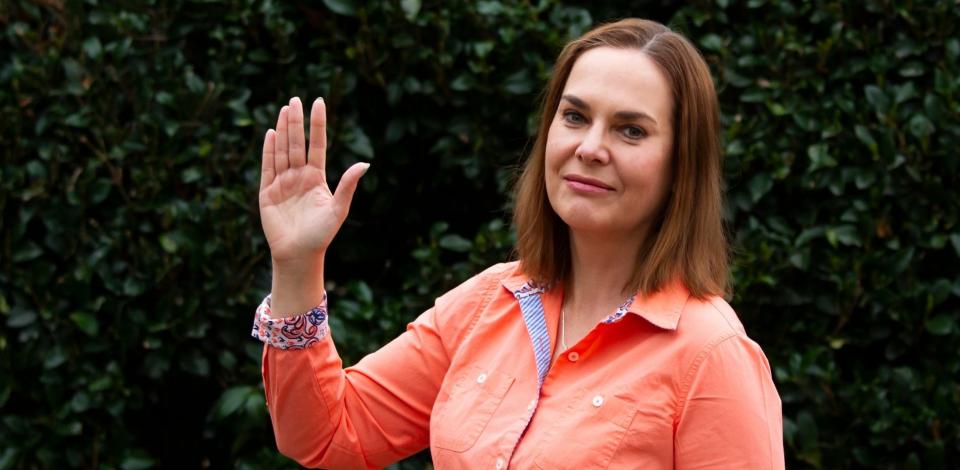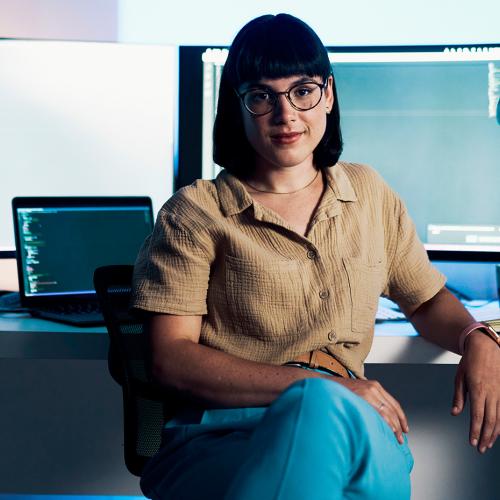International Women's Day: Inspirational Women in STEM
12 Georgia Tech women share how they choose to challenge gender bias and inequality

Sasha Boldyreva, Online Master of Science in Cybersecurity Faculty, raised her hand in support and solidarity that she commits to choose to challenge and call out inequality.
Across all sectors, women have made key contributions in the workforce and at the beginning of 2020, the representation of women in corporate America was trending in the right direction. A recent study from McKinsey showed that representation of women in senior-vice-president positions grew from 21%, and representation in the C-suite had grown by 23%.
Despite some progress over the last decade, many challenges remain as a result of systemic inequalities, biases, policy issues, and gender stereotypes. Conversely, early research shows that the effects of the Covid-19 pandemic could exacerbate the limited progress that has been made on gender equality and women’s rights.
At Georgia Tech Professional Education (GTPE), we believe progress is achievable, but will require a willingness to embrace the power of inclusion. We also believe the future of work is better equipped with women at every table where decisions are being made.
This year on International Women’s Day, we’re celebrating women’s leadership in all its forms, featuring the inspirational words of our faculty, staff, and learners who choose to challenge gender bias and inequality every day.
A Recap of our Women in STEM
- Sasha Boldyreva, Online Master of Science in Cybersecurity
- Nisha Botchwey, Georgia Tech Professional Education
- Dana Boyd, Georgia Tech Professional Education
- LaTrese Ferguson, Workplace Learning & Professional Development
- Amy Corn, Georgia Tech Profesisonal Education
- Jacqueline Garner, Online Master of Science in Analytics
- Yakut Gazi, Georgia Tech Professional Education
- Maria Konte, Online Master of Science in Cybersecurity
- Stefany Sanders, Georgia Tech Professional Education
- Nicoleta Serban, Online Master of Science in Analytics
- Yao Xie, Online Master of Science in Analytics
- Alenka Zajic, School of Electrical and Computer Engineering
What’s the biggest thing you feel like other women can do to support each other?
Corn: Particularly in the corporate environment, and in environments where women are underrepresented, we foster competition amongst each other. Instead of competing, we should seek to amplify the voices of others and elevate the work of women in achieving common goals. Women have unique problem solving, collaboration and leadership abilities. When women work together, we can make a difference. There is power in numbers!
Ferguson: I believe wholeheartedly in being an example of excellence. The easiest way for women to support one another is to speak positive, uplifting words to each other, mentor, and bring others alongside. Each crack in the proverbial glass season makes it easier for the next woman, and eventually, those cracks will rupture, break, and the boundaries will be broken.
Gazi: We, as women, need to believe that there is room for all of us to succeed. We need to believe that the real success and recognition is not being the only/token woman at the table. The real success is to ensure there is succession when you leave that precious seat. The real success is to gain the majority in that room.
What’s one action you see women do that limits gender equality?
Botchwey: Young women today are bold, fierce and brave. To ensure they realize their full potential, their mothers, aunts and sisters, but especially, their dads, uncles, and brothers must block the excessive obstacles that will attempt to derail their impact, and prepare the way for their promising contributions to a healthier, more sustainable and just world.
Boyd: In the workplace we are often harder on other women than we are on everyone else, sometimes even going too far in trying to show that we are not using favoritism to advance other women. We need to take a step back and ask ourselves if we would have held someone else to a different standard.
Ferguson: Letting a scarcity mindset fool us into believing there is only so much room. This prevents us from wholeheartedly making room for others. Let's shift from a mentality of scarcity to abundance, and let's do the work have the difficult conversations to make it so.
Gazi: Women should fight for girls’ and women’s education and economic independence more fiercely than they do. Men and women need to raise emancipated daughters and sons who uphold women’s liberty. We, as mothers and teachers need to stop raising boys and girls that “fit” into the society. We need to raise them to bravely lead change. We need both girls and boys to be feminists
Sanders: I learned recently that The World Economic Forum tracks a series of gender equality metrics in every country around the globe, and the U.S. is 208 years away from equality. I want my boys to understand what inequality and bias is and looks like, so they can grow into being fully conscious men who take an active role in reaching that milestone sooner.
Serban: We all start with biases that we farther them onto our own children and students. Removing biases and inequality is a process, which will require multiple generations to be adapted to our new belief system and values. We need to make additional effort to take action in addressing biases in or own world. We also live in a global world; just like the exchange of goods, we also exchange beliefs, biases and inequalities. It needs to be a global world endeavor, just like climate change, we could call it women’s world change.
What is your advice to your younger self, younger women, or other women?
Boyd: To have confidence, know my worth, and to not let anyone else dictate to me what I could do or become, especially based on my gender.
Garner: Surround yourself with people who REALLY know you and who encourage your strengths. Be fearless in the pursuit of your dreams. Smile.
Xie: Live up to your dreams and never let others' opinions overshadow your ambitions. Sometimes, it may take courage and temporary loneliness. Time has changed for the better, but there are still biases and stereotypes towards girls and women in STEM. We, together, will prove that we can do it. We are half the sky.
Zajic: Be braver and doubt myself less, an imperfect outcome is not always a failure.
What's one way you work to challenge gender bias and inequality?
Sanders: Attitudes about gender bias and inequality start at home and are reinforced throughout our culture. I raise my sons to question everything they hear and see that falsely categorizes girls or women (and other non-dominant groups). It started with the color pink is not a “girl color” and has evolved to things like challenging stereotypes in the shows they watch, to looking up the dates of when various groups of people got the right to vote and wondering why, and having frequent dinner conversations about things like gender imbalance in various professions.
Serban: Inspire, support, educate. Make it part of my daily life just like other routine activities that have become ingrained in our behaviors (e.g. recycling).
What vision do you see for the young girls of today?
Boldyreva: Growing up, I often thought, "I cannot do that.” But when I tried, I learned that I could do it. Don't be afraid of trying. We can do so much.
Boyd: Believing that they really can accomplish ANYTHING. There are so many wonderful female role models today. There is absolutely no reason for young girls not to dream big.
Ferguson: I envision a limitless future for young girls of today, including my 10-year-old daughter. A future where there are many examples of women in leadership. A future where she can see a multitude of positive women who look like her fearlessly leading, paving the way for those that will come behind them. I truly believe if you can see it, you can be it.
Konte: Leading figures can be powerful guides while providing understanding, respect, and empathy for all. Also, younger female researchers don’t have to hide their emotional charismas or intelligence in order to succeed.
Zajic: I hope that girls of today will not have to discuss diversity, because it would be the normal state of affairs.
At Georgia Tech Professional Education, we believe progress in gender parity is achievable but will require a willingness to embrace the power of inclusion. We also believe that collectively, we can help create an inclusive world. Read more celebration stories from some of Georgia Tech's remarkable women.

